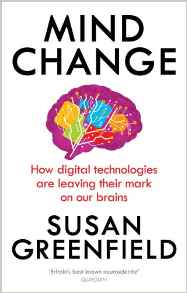 The sub title to the book is “How digital technologies are leaving their mark on our brains”.
The sub title to the book is “How digital technologies are leaving their mark on our brains”.
It’s a valid question. It’s tempting to say we live in unprecedented times as our lives become more digital and our connections with others increasing changing from in person to digital, but I wonder if the pace of change is any more radical than the Industrial Revolution, or the advent of mass communication? Very difficult to know in so far as the very act of observing something changes it. Indeed towards the end of the book Socrates is quoted, 400 BCE, concerned that new fangled writing skills would “create forgetfulness in the learners’ souls, because they will not use their memories;they will trust to the external written characters and not remember of themselves” – the author notes people have similar concerns today about the effect of the Internet on learning and processing.
Through this book the author explores the basic workings of the brain, how the brain becomes mind and consciousness, and the effects of social networking, gaming and web surfing – the latter as a way of describing researching, learning and acquiring knowledge – on the workings of the mind, both internally and how we relate to others. Touched on are how attention span, cognition, personal identity, recklessness, aggression, mental processing and empathy may be affected by the digital world.
It would be easy for this book to veer towards reactionary hysteria, and to the authors credit it doesn’t – she address the issues in a balanced fashion. Likewise the pace is kept fresh and accessible.
An interesting read for anyone wanting an overview of the field; however the question is to buy the physical book or the e-book… …You’ll need to draw your own conclusions on that one, suffice to say the author suggests there are differences. Caveat emptor.
It can be purchased on Amazon, and if you use this link, Yinspire earns a small commission.
